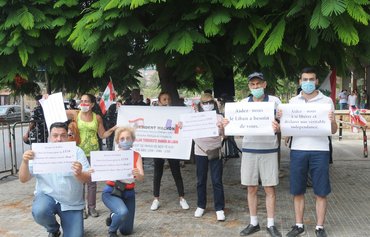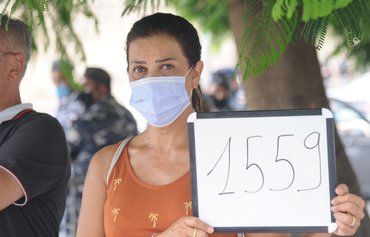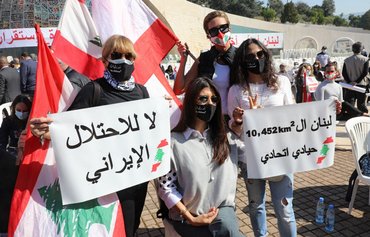BEIRUT -- Many Lebanese taking part in the ongoing popular protests are demanding the full implementation of United Nations Security Council Resolution (UNSCR) 1559.
UNSCR 1559 (of 2004) calls for the disbanding and disarmament of all militias in Lebanon, and affirms Lebanon's sovereignty, territorial integrity, unity and political independence under the sole and exclusive authority of the government.
The United States, France, Arab and Gulf states are playing a leading role in ensuring the full implementation of the resolution.
"Hizbullah's accumulation of dangerous weapons, smuggling and other illicit and corrupt activities undermine legitimate state institutions," US envoy David Hale said in mid-April from Baabda Palace. "They rob the Lebanese of the ability to build a peaceful and prosperous country."
![Anti-Hizbullah protesters February 4 in Beirut hold pictures of slain Lebanese activist Lokman Slim. [STR/AFP]](/cnmi_di/images/2021/05/10/29793-Lokman-Slim-protest-600_384.jpg)
Anti-Hizbullah protesters February 4 in Beirut hold pictures of slain Lebanese activist Lokman Slim. [STR/AFP]
At the 75th session of the UN General Assembly in September, Saudi King Salman bin Abdulaziz explicitly stated that the security and stability to which the Lebanese aspire necessitates the disarming of Hizbullah.
Implementing UNSCR 1559
Regina Kantara, director of the World Council for the Cedar Revolution, has been working to raise national awareness and highlight the importance of UNSCR 1559 and subsequent related UN resolutions.
"Our goal as activists is to implement the remaining provisions of UNSCR 1559 related to curbing Hizbullah and its interference in the political decision-making process," Kantara said.
"The burning of protesters' tents and assassination of political activist Lokman Slim underscored the importance of implementing the resolution," she said.
Slim, who was known for his opposition to Hizbullah, was found dead in his car near the southern town of Tefahta on February 4.
Early on in the protests, in October 2019, a group of Hizbullah supporters assaulted a protest site on Beirut's Ring Bridge, tearing down tents set up by those participating in the demonstrations in order to reopen the road.
Hizbullah supporters attacked the demonstrators with sticks, beat them and threw stones at them, before going on to storm Martyrs' and Riad al-Solh squares, where they destroyed tents and set them on fire.
The country's central problem is that Iran exported its revolution to Lebanon, Kantara said, isolating Lebanon and exercising its control through Hizbullah.
She expressed her hope that the United States, European countries -- particularly France -- and Arab and Gulf states "will push for the full implementation of Resolution 1559 and [equip] the Lebanese army".
International support
There is "increased co-ordination between the United States, Europe and Gulf Co-operation Council (GCC) countries because they are aware of Lebanon's problem with Hizbullah's weapons", political writer Tony Abi Najm said.
Hizbullah's armed presence in Lebanon serves its own interests and those of Iran and "is preventing the establishment of the state", he said.
Following a March 24 meeting with President Michel Aoun, the Saudi ambassador to Lebanon announced that the kingdom supports Lebanon's sovereignty and called for the implementation of UNSCR 1559.
This a clear indication of the Arab-US-international intent to push for the implementation of the resolution, and others like it, Najm said.
The Lebanese hope that this co-ordination will translate into practical decisions to implement the resolution and liberate Lebanon from Iran's hegemony, he said.
"The solution to the problem begins with the liberation of the Lebanese state from Iran and Hizbullah," Najm said.
Disarming Hizbullah
The international community is called upon to "rein in Iran, and with it Hizbullah, and implement UN resolutions 1559, 1680 and 1701", said political writer Mohammed Nimr.
These resolutions call for the disarmament of all militias in Lebanon, including Hizbullah, and for Lebanon to exercise control over the country's borders.
"Hizbullah has not complied with any of them, or with the Taif Agreement," Nimr said.
Hizbullah's disarmament is "no longer only a Lebanese demand but an international and Arab-Gulf demand, as expressed by the Saudi monarch", he noted.
The path to Hizbullah's disarmament must begin with alleviating the economic suffering of the Lebanese and the formation of a government, he said.
Nimr noted that it will not be easy to formulate a strategy that pushes Hizbullah to surrender its weapons and restricts the possession of arms to the Lebanese army.
This is because the problem with Hizbullah is not just its arms but its ideology, which swears allegiance to Iran's Wali al-Faqih (Guardian Jurist) and weighs the state down.
"The logic of the state must prevail over the logic of militias and the statelet," Nimr said.
"Lebanon needs the support of the international community to implement international resolutions and the initiative of [Maronite] Patriarch Beshara Boutros al-Rahi," he said.
Al-Rahi in July called for Lebanon to return to its policy of neutrality, and in February followed up on this demand, calling for a UN-sponsored international conference on Lebanon's economic collapse and political impasse.

![Lebanese protesters gather for the speech of Maronite Patriarch Beshara Boutros al-Rahi on February 27 at the Maronite Patriarchate in the mountain village of Bkerki. Al-Rahi has called for a UN-sponsored international conference on Lebanon. [Anwar Amro/AFP]](/cnmi_di/images/2021/05/10/29792-Lebanese-protesters-Bkerki-600_384.jpg)






